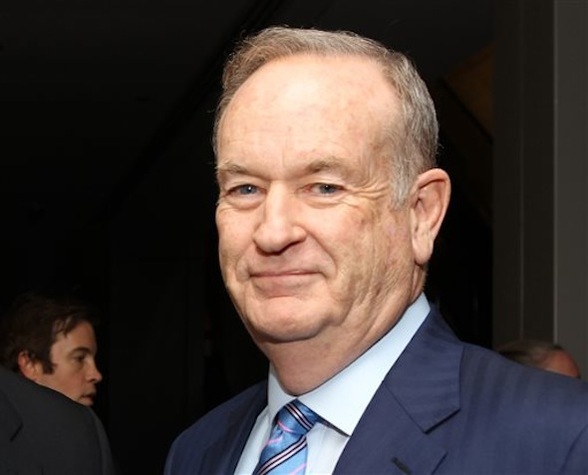
No Spin Zone Bill O’Reilly attends the National Geographic Channel’s Killing Kennedy 2013 world premiere screening reception at The Newseum, in Washington. (AP Photo/Paul Morigi)
Fox News host Bill O’Reilly continued a boisterous defense this week against charges originally leveled by a Mother Jones report that accused him of exaggerating his experience in war zones. On The O’Reilly Factor on Monday night, he rehashed 1982 Buenos Aires protests in a 9-minute piece complete with archival footage from CBS News. “As you may know, some left-wing zealots have attacked me, your humble correspondent,” O’Reilly began. “They say I trumped up my war experiences in the Falklands conflict and in El Salvador.”
Later that night, The New York Times added its own story about O’Reilly’s cub reporter days. And true to form, he came out swinging once again. “I am coming after you with everything I have,” O’Reilly told a Times reporter by phone. “You can take it as a threat.”
Though the Fox host didn’t respond to requests for comment on the initial MoJo piece, whose title provocatively likened his claims to those of disgraced NBC newsman Brian Williams, he has since lambasted co-author David Corn and other reporters and outlets with ad hominem attacks across a wide array of media. Fox executives have publicly backed the primetime host.
The aggressive strategy stands in stark contrast to that of NBC News, which eventually suspended its star anchor in wake of a Feb. 4 Stars and Stripes piece debunking a story he told about covering the Iraq war. The difference between the cable channel’s PR offensive and NBC’s damage control reflect not only the allegations and news organizations that surfaced them, but also how both networks view their identities and audiences. Regardless of the facts in O’Reilly’s case, the ensuing media controversy is one that plays to his and Fox News’ inherent strengths.
Fox has made clear that it doesn’t see itself bound by the same rules of public accountability it calls on other news organizations to uphold. The cable channel has a niche—albeit huge—right-wing audience. Sixty percent of its viewers considered themselves conservative in 2012, according to a Pew report, as did 69 percent of O’Reilly’s followers. In another Pew study in 2014, both “moderate” and “consistent” conservatives said that they trusted Fox for political news more than any of the 35 other outlets surveyed. The latter group expressed distrust in 24 of those remaining news organizations, including The New York Times, The New Yorker, network news channels, NPR, and Bloomberg.
The culture war between Fox hosts and these “liberal media” outlets is not an effect of the station’s programming, but a centerpiece. The combative stance taken by O’Reilly, the louder equivalent of a newspaper columnist, is as much of an attraction as the content of his show — perhaps it’s even the main draw. He’s brilliant in this sense, and more than 3 million people tune in every weeknight because of it.
Williams, a more straightlaced newsman despite his pop-culture bona fides, never boasted the same cult of personality. What’s more, his controversy is more charged than O’Reilly’s given that it involves American troops in a war whose effects are still being felt at home, not civil unrest on a different continent 33 years ago. For Williams to rebut the claims would have required him to dispute either a well-respected newspaper or US soldiers’ memories, a shaky strategy for a news organization that draws a huge national audience across the political spectrum. O’Reilly, aided by remaining ambiguities in the allegations brought against him, had both room and incentive to mount a pugnacious defense against “the liberal media.”
The cable channel’s strategy couldn’t have differed more from that carried out by NBC News. Stars and Stripes editor Terry Leonard told CJR that Williams spoke to the newspaper “immediately” after a reporter approached him with allegations. “[Williams] was very upfront about the fact that he blundered,” Leonard said. Though Williams’ additional apologies on Facebook and the evening newscast mentioned details that were later called into question, his tone bespoke a measure of regret.
Still, with mainstream media coverage hitting a fever pitch — the New York tabloids combined to plaster Williams’ face on their covers seven times between Feb. 6 and Feb. 18 — NBC News suspended Williams and began an internal review of his work. Forty percent of Americans don’t believe the anchor should be allowed back behind his desk, according to a CNN/ORC poll. NBC News did not respond to a request for comment.
There are no signs yet O’Reilly will face similar backlash from his audience or punishment from his bosses. Regardless of its merits, Mother Jones’ reporting and the derivative coverage since can be easily framed as another conspiracy pushed by a Machiavellian mainstream press. If Fox viewers see no reason to hold O’Reilly accountable, Ailes & Co. will follow their lead. That support for the primetime-dominating host seems unlikely to waiver, even if more damning evidence arises.
David Uberti is a writer in New York. He was previously a media reporter for Gizmodo Media Group and a staff writer for CJR. Follow him on Twitter @DavidUberti.
